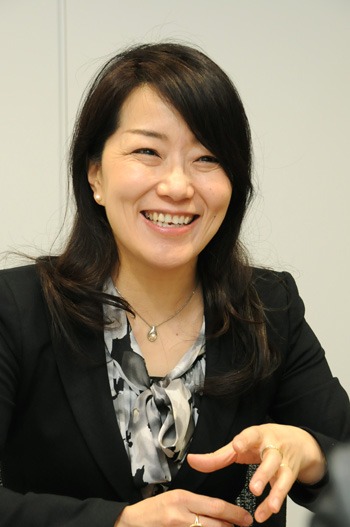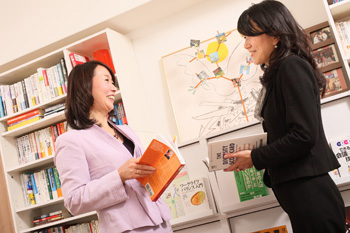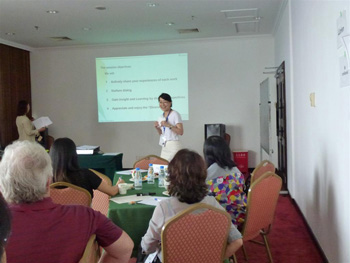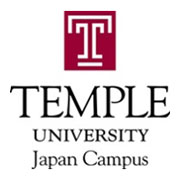Key career choices need careful thought
March 10, 2014
By Chiho Iuchi
Staff writer
Life is full of twists and turns and family issues often create obstacles to careers, especially for women. Natsu Iwaki, who works as senior researcher for a Japanese diversity management consulting firm and is making best use of her eight years of study in the U.K., has come a long way in her career.

Natsu Iwaki, senior researcher at Qualia Inc. SATOKO KAWASAKI
In Japan, the Equal Employment Opportunity Act for Men and Women, which requires employers to ensure equal treatment of men and women in recruiting, hiring, assignment and promotion and prohibits discriminatory treatment in training, benefits, retirement and dismissal, came into force in 1985. As one of the first batch of graduates after the enactment of the law, Iwaki started working in 1986 for an electronics company within the Fujitsu group, with high expectations.
"I was very impressed by the pleasant atmosphere at a gathering of retired company staff and really hoped to join them after a lifetime of employment at Fujitsu," said Iwaki, who was also aware that many female workers quit their jobs when they were around 28 or 29 years old.
Her boss offered her advice, saying, "If you are serious about having a career, it's better to train outside the company." Iwaki applied for an in-house program, which paved the way for overseas training at the Japan-America Institute of Management Science (JAIMS) in Hawaii in 1989.
Although it was a short 11-month program composed of business courses and an internship at an American firm, she had an opportunity to interact with about 30 fellow Japanese from other companies and about 30 non-Japanese trainees.
"Most of the Japanese trainees were men in their 30s or 40s, who were serious about their career development. They taught me the importance of being autonomous, rather than just relying on what was provided by the company," Iwaki said.
After returning home, Iwaki continued to work for Fujitsu as a domestic marketing and sales representative for seven years, during which time she married and gave birth to a daughter.
She reached a turning point in her career when her husband accepted an overseas assignment in the U.K. in 1995.
"I liked my job and was confident I could manage both my work and raising my child, so I considered letting my husband go to the U.K. alone," Iwaki said. However, the 1995 Great Hanshin Earthquake changed her mind.
"We lived close to the affected areas, and some of my friends lost their lives or family members, which made me realize how important it was for a family to stay together," she said.
Eventually she quit her job and moved to the U.K. with her husband and daughter at the end of 1995. Although she tried to continue working for either a Fujitsu-related company or even another company, it turned out to be difficult in Cardiff, Wales, where her husband was assigned.
"There were some opportunities in London, but it was a two-hour train ride from Cardiff. But I learned Cardiff was home to good universities and educational institutions," said Iwaki, who decided to study for a Master of Business Administration (MBA). "I just wanted to study something that could help me go back to work," she said.
She started to study in 1996 at the Cardiff Business School of Cardiff University, while enrolling her 3-year-old daughter in day care provided by the university.
The courses were attended by international students, who broadened her perspective, which had leaned toward the American way of thinking through her training at JAIMS.
"There were many students from Europe, Africa and the Middle East, who inspired me a lot. I enjoyed studying, working on various projects and discussing business cases with them," Iwaki said.
The course not only looked at the results of tasks, but also examined the group's dynamics.
"I thought of myself as a cooperative team player. But, to my surprise, many of my classmates evaluated me as a 'finisher' who can find ways to accomplish difficult tasks," Iwaki said.

Natsu Iwaki discusses diversity with Masako Arakane (left), president of Qualia Inc. in their office in Osaka. QUALIA INC.
Her classes taught her the importance of being aware of one's abilities and reviewing project processes to improve team productivity.
After successfully earning an MBA, she decided to pursue a Ph.D.
"I enjoyed doing my MBA so much and felt like I was meant for this kind of study," Iwaki said. "But I was too naive."
Specializing in organizational behavior theory, Iwaki studied hard, but the workload required for a Ph.D. turned out to be much heavier than that needed for an MBA.
Also, she ran into difficulty balancing her many roles: wife and mother at home, Ph.D. student at university, spouse of an expatriate employee in Cardiff's Japanese community, and PTA member at her daughter's private school.
Additionally, family issues in Japan forced her to travel back and forth between Japan and U.K.
Despite the difficult situation, Iwaki completed the course requirements of her doctoral program between 1998 and 2004, but she finally gave up on getting her Ph.D.
"When I faced the fact that I could not save my father's small trading company, my knowledge seemed useless and I couldn't see the point in pursuing a Ph.D. any more," she said.
Looking back, she regretted not having carefully mapped out her career path when she came to a turning point after her MBA.
"I might have been too quick to decide to pursue a Ph.D. without thinking about the purpose and meaning for me to do so and without realizing how hard it would be in my situation," she said.
Quoting Toshihiro Kanai, professor of organizational behavior at Kobe University, Iwaki said, "You don't need to always think about your career development, but when you come to a significant milestone, it's very important to carefully map out your career plan and make a good decision for the future."
In this regard, she now realizes the importance of a personal network, which could help "to expand your horizons and increase your options to make a better decision."
"I carried the burden by myself," Iwaki said, thinking back to those days. "That made it more difficult to find a solution to get out of the situation."
Of course, family members are generally the first people to confide in, but "they are often in the same boat when we suffer from family issues like me. So I find it important to consciously build up a personal network outside the family as well,". she said.
Iwaki encourages finding good mentors, role models and supporters.
"Mentors are those who encourage you to think; role models are the people you want to be like; and supporters are those who always stand by you," Iwaki explained.

Iwaki speaks at a workshop on diversity during the International Association of Facilitators Asia Conference, which was held in Shenzhen, China in September, 2012. QUALIA INC.
Coincidentally, it was her personal network that helped her restart her career in Japan, when she came back from the U.K. in 2004 "in frustration," she said.
Initially, she got an offer from Fujitsu to join one of its new projects. And then, a friend introduced her to Masako Arakane, who, at that time, was co-head of Life Career Design Associates Co.
Arakane asked Iwaki to research the current status of gender equality at small and medium-size enterprises in Osaka.
"Arakane was happy with my work, which led to more offers," Iwaki said.
After working for two years as independent researcher, in 2006, Iwaki joined Arakane and they established Qualia Inc., an Osaka-based diversity management consulting firm, where Iwaki works as senior researcher.
For the past eight years, Iwaki has been involved in various program designs and assessments of diversity and inclusion (D&I) in Japanese organizations. She is also engaged in the investigation and analysis of in-house research studies of employee satisfaction and communication.
Recently, she has been working more as a process facilitator and a consultant to support diversity-oriented groups and organizations by helping their discussion in the cooperative creative processes to encompass various values and thinking styles.
"This is because our clients (Japanese companies) are starting to realize that workers with diversified values exist within their organizations and are beginning to focus on how to capitalize on such workers' abilities and ideas to achieve sustainable growth," Iwaki explained.
Rather than working as a pioneering generation under Japan's Equal Employment Opportunity Law in traditional Japanese companies, in which many female workers have given up their careers, Iwaki's work today supports women going to work in such companies.
"Of course I thought about rejoining my previous company, but finally I chose my present job, because I thought that I could make better contribution in this field," Iwaki said.
"When I gave up the Ph.D. and came back home, I felt like my education in the U.K. was useless in Japan," Iwaki said. "But it turned out that everything that I learned in the process of pursuing my Ph.D., such as research methods, organizational behavior, leadership development and academic logic, is very useful when we make proposals to the management of Japanese companies."
"Besides the academic approach, my experience at Fujitsu helps me understand our clients," she added.
"In view of changing demographic structures caused by super-aging population in Japan, it is inevitable for a company's growth, or even survival, to have a diverse workforce perform well together and have better output," Iwaki emphasized, and noted that it's necessary to consider how to make a company a great place to work for a diverse workforce.
"This is a very important subject, not only in terms of gender equality. I believe that more basic study is needed," Iwaki said.
From April, Iwaki will be involved in facilitating the Business Leadership Program at Rikkyo University's College of Business.
"It's challenging to strike a balance with my job at Qualia, but it would be a pleasure if I could be of some help to the future generation by sharing my experience and expertise," Iwaki said. "This is my decision on another milestone of my career."


